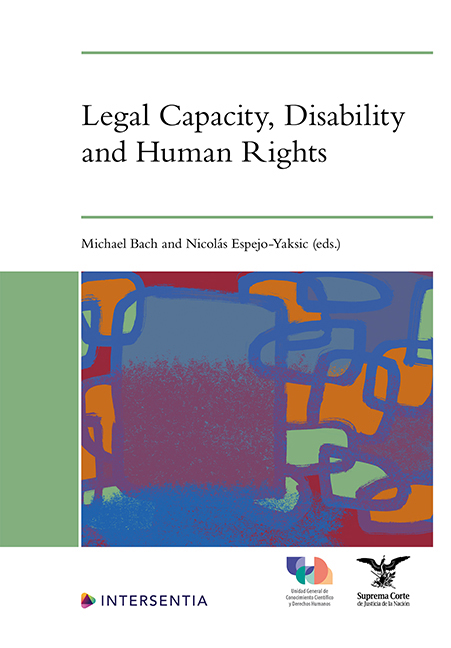Book contents
- Frontmatter
- Foreword
- Acknowledgements
- Contents
- List of Cases
- List of Contributors
- Legal Capacity, Disability and Human Rights: Introduction
- PART I HISTORICAL PERSPECTIVES AND THEORETICAL FRAMES
- PART II LAW REFORM: COUNTRY AND REGIONAL PERSPECTIVES
- PART III LEGAL QUESTIONS, PERSISTENT CHALLENGES
- Index
- About the Editors
Legal Capacity, Vulnerability and the Idea of “Person”
Published online by Cambridge University Press: 03 April 2024
- Frontmatter
- Foreword
- Acknowledgements
- Contents
- List of Cases
- List of Contributors
- Legal Capacity, Disability and Human Rights: Introduction
- PART I HISTORICAL PERSPECTIVES AND THEORETICAL FRAMES
- PART II LAW REFORM: COUNTRY AND REGIONAL PERSPECTIVES
- PART III LEGAL QUESTIONS, PERSISTENT CHALLENGES
- Index
- About the Editors
Summary
To love, to derive joy from life, to learn the wonder of being: these are, I offer, the apotheosis of a good life, one that everyone can achieve – and that, perhaps, even a philosopher can appreciate.
INTRODUCTION
The equal recognition of the legal capacity of persons with intellectual, cognitive and psychosocial disabilities is a matter whose normative relevance in the field of political and moral philosophy, as well as in that of legal doctrine, is not especially relevant. Perhaps this is due, in part, to the fact that deep-seated liberal political or moral philosophy, and the law built around it, have tended to do with out the uncomfortable presence of vulnerability and dependency and with out the capital function of interpersonal relationships in exercising individual autonomy. Thus, while these categories seem to be “relegated” to specific fields – and relatively marginal or secondary in the great scenario of legal doctrines, such as family law or labour law – private law inhabits a space of, at least, tension with them. Thus, while dogmatic debates are opened, and new regulatory frameworks are created that invigorate the relationship between private law and fundamental rights – for example, in terms of nondiscrimination, privacy or access to information – other legal institutions remain alive and unquestioned. Such is the case of legal capacity.
My impression, however, is that the study of legal capacity – especially its specific conception as developed in the United Nation Convention on the Rights of Persons with Disabilities (UNCRPD) – is not a marginal nor a “niche” legal matter. The model of equal recognition of the legal capacity of all individuals and the establishment of a support system for decision-making, including the necessary safeguards for its exercise – is not an “irrelevant case” for theories of justice or the law. It is, instead, a hard case: a case that challenges its normative and legal dogmas. As such, studying the legal capacity of persons with intellectual, cognitive or psychosocial disabilities can allow us to improve philosophy and law. Not least significantly, a better understanding of the idea of legal capacity can help us reconstruct our conception of justice and the legal institutions derived from it in a way that is relevant, also, to specific people whose human lives deserve equal respect and consideration.
- Type
- Chapter
- Information
- Legal Capacity, Disability and Human Rights , pp. 89 - 106Publisher: IntersentiaPrint publication year: 2023



